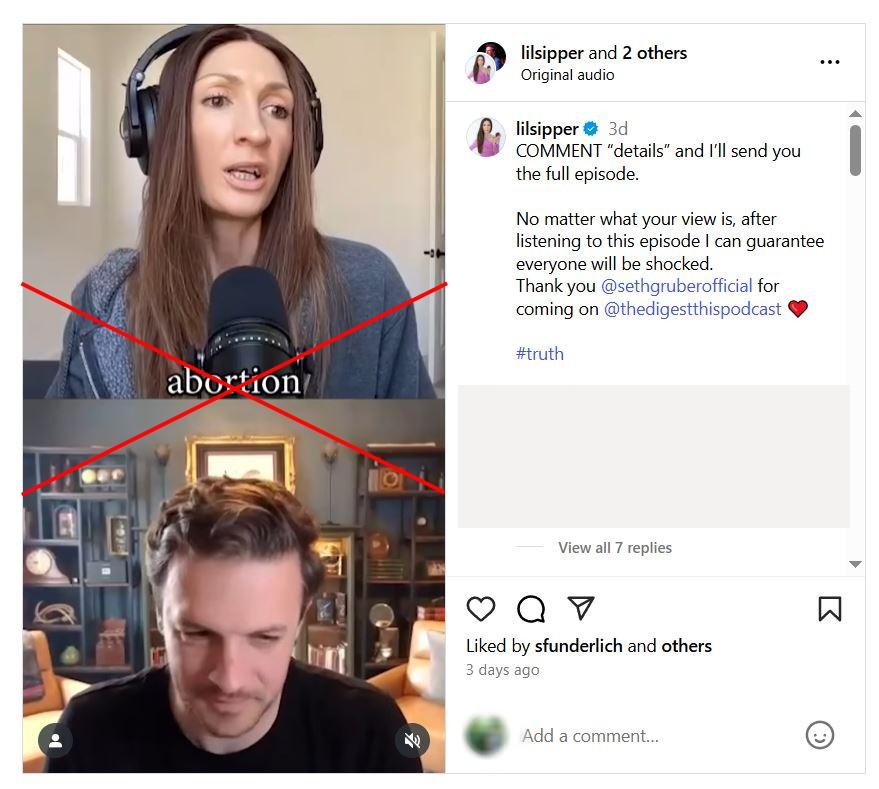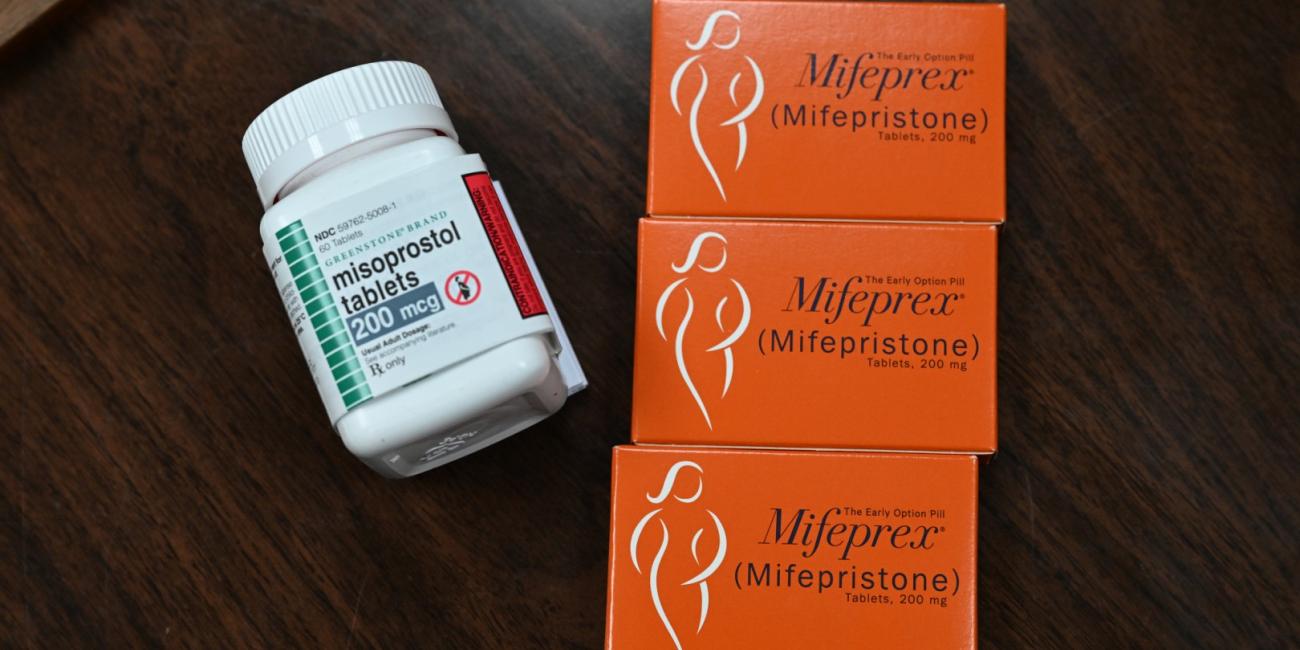
Misinformation about abortion safety spreads via US podcast
- Published on July 25, 2025 at 16:45
- Updated on July 25, 2025 at 20:55
- 5 min read
- By Marisha GOLDHAMER, AFP USA
"Does having an abortion increase a woman's risk for getting breast cancer?" asks health influencer Bethany Cameron in a video clipped from her podcast and shared to her 1.5 million Instagram followers July 10, 2025.
"Yes," says Seth Gruber, founder of The White Rose Resistance, a US advocacy group he describes as a "pro-life ministry."

The exchange comes from a longer conversation on the July 9 episode of Cameron's "Digest This" podcast.
Gruber made similar claims in 2024 when he appeared on "Make America Healthy Again" influencer Alex Clark's podcast Culture Apothecary, an episode that has tens of thousands of views on YouTube.
The episodes aired as legal and legislative battles over abortion play out across the United States following the Supreme Court decision to overturn the federal protection for the right to the procedure in 2022.
It also comes as misinformation about the safety of abortion, which has been shown to influence public perception and policy making, continues to spread (archived here and here).
Findings from leading health organizations show Gruber's comments about the risks associated with abortion are inaccurate.
The American College of Obstetricians and Gynecologists (ACOG) Committee on Gynecologic Practice says there is "no causal relationship between induced abortion and a subsequent increase in breast cancer risk" (archived here).
Breast cancer risk
According to the US Centers for Disease Control and Prevention (CDC), several factors (archived here) contribute to innate greater risk of breast cancer. They include age, inherited genetic mutations, family history of breast or ovarian cancer, breast tissue density and whether the person started menstruation prior to the age of 12. Other variables a person can impact, such as their activity level, weight and consumption of alcohol.
Reproductive history also plays a role. The National Cancer Institute says on its website: "Women who have their first full-term pregnancy at an early age have a decreased risk of developing breast cancer later in life" (archived here).
The number of births makes a difference, with more children linked to a lower risk (archived here). Breastfeeding for a year or more is also associated with decreased risk (archived here and here).
Some studies in the mid-1990s suggested induced abortion was associated with an increased risk of breast cancer (archived here). However, ACOG and the American Cancer Society say the studies had important design limitations.
"Higher-quality studies have generally found no link between abortions and breast cancer risk," the American Cancer Society's website says (archived here).
Jo Freudenheim, professor at the University at Buffalo School of Public Health, explained two kinds of studies commonly used to examine the relationship between abortion and breast cancer to AFP in a July 15 email (archived here).
Case control studies, which compare women with a new cancer diagnosis to those with no cancer history, may suffer from "recall bias," she said. Those recently diagnosed "will be thinking about their health history in a different way" and may recall more events than healthy women.
Cohort studies have participants fill out questionnaires about their reproductive histories and then follow them to see who gets breast cancer, eliminating this bias. But in cohort studies, Freudenheim said follow-ups are essential to producing reliable results.
In both study designs, confounding factors such as age at first pregnancy must be considered to see if the association is truly related to abortion.
A study published in 2020 analyzed the combined results of six cohort studies and eight case-control studies and concluded that abortion is not associated with breast cancer risk in women who have never given birth to a child (archived here).
Over the past 15 years, medication abortions have increased steadily in the United States (archived here), drawing attention to the drugs mifepristone and misoprostol which are used in the procedure.
But Katharine O'Connell White, chief of obstetrics and gynecology at Boston Medical Center (archived here), and A Mariquit Rosete Lu, an obstetrics and gynecology specialist (archived here), told AFP: "There is no evidence that either drug leads to a higher risk of breast cancer."
"In fact, mifepristone's anti-progesterone effect has been explored as a potential therapy for patients with progesterone-sensitive breast cancer," they said in a July 24 email.
A comprehensive review from the National Academies of Sciences Engineering and Medicine (NASEM) also said abortions were not found to increase the risk of breast cancer (archived here).
Maternal mortality
In the video with Cameron, Gruber also asserts that having an abortion is far more dangerous that giving birth.
Experts AFP talked to and the NASEM's 2018 report show that childbirth is more dangerous than elective abortion (archived here and here).
The United States is one of the more dangerous advanced-economy countries to give birth, with Black Americans dying at a rate three times higher than white people (archived here).
The World Health Organization defines a maternal death as "deaths from any cause related to or aggravated by pregnancy or its management (excluding accidental or incidental causes) during pregnancy and childbirth or within 42 days of termination of pregnancy, irrespective of the duration and site of the pregnancy" (archived here).
Following this definition, the CDC reported the 2022 maternal mortality rate was 22.3 deaths per 100,000 live births (archived here).
By contrast, the mortality rate from legal, induced abortion for the same year was 0.8 deaths per 100,000 abortions (archived here).
A separate long-term analysis of mortality rates from 1998 to 2005 concluded: "The risk of death associated with childbirth is approximately 14 times higher than that with abortion" (archived here).
This statistic is disputed by groups that oppose abortion, who argue death certificates fail to document if the procedure led to a death by suicide or alcohol abuse.
But White and Lu pointed to a five-year longitudinal study which compared outcomes for women who had abortions to those denied the procedure. It found no significantly higher risk of suicidal ideation, mental health problems or substance abuse in the abortion group (archived here).
ACOG has also raised concerns about restrictions on abortion, saying on its website that where the procedure is illegal or highly restricted, women often resort to unsafe means (archived here).
"Today, approximately 21 million women around the world obtain unsafe, illegal abortions each year, and complications from these unsafe procedures account for approximately 13 percent of all maternal deaths, nearly 50,000 annually," the organization says.
More of AFP's reporting on false and misleading claims about abortion is available here.
This article was updated to add examples of the claim from 2024.July 25, 2025 This article was updated to add examples of the claim from 2024.
Copyright © AFP 2017-2026. Any commercial use of this content requires a subscription. Click here to find out more.
Is there content that you would like AFP to fact-check? Get in touch.
Contact us




